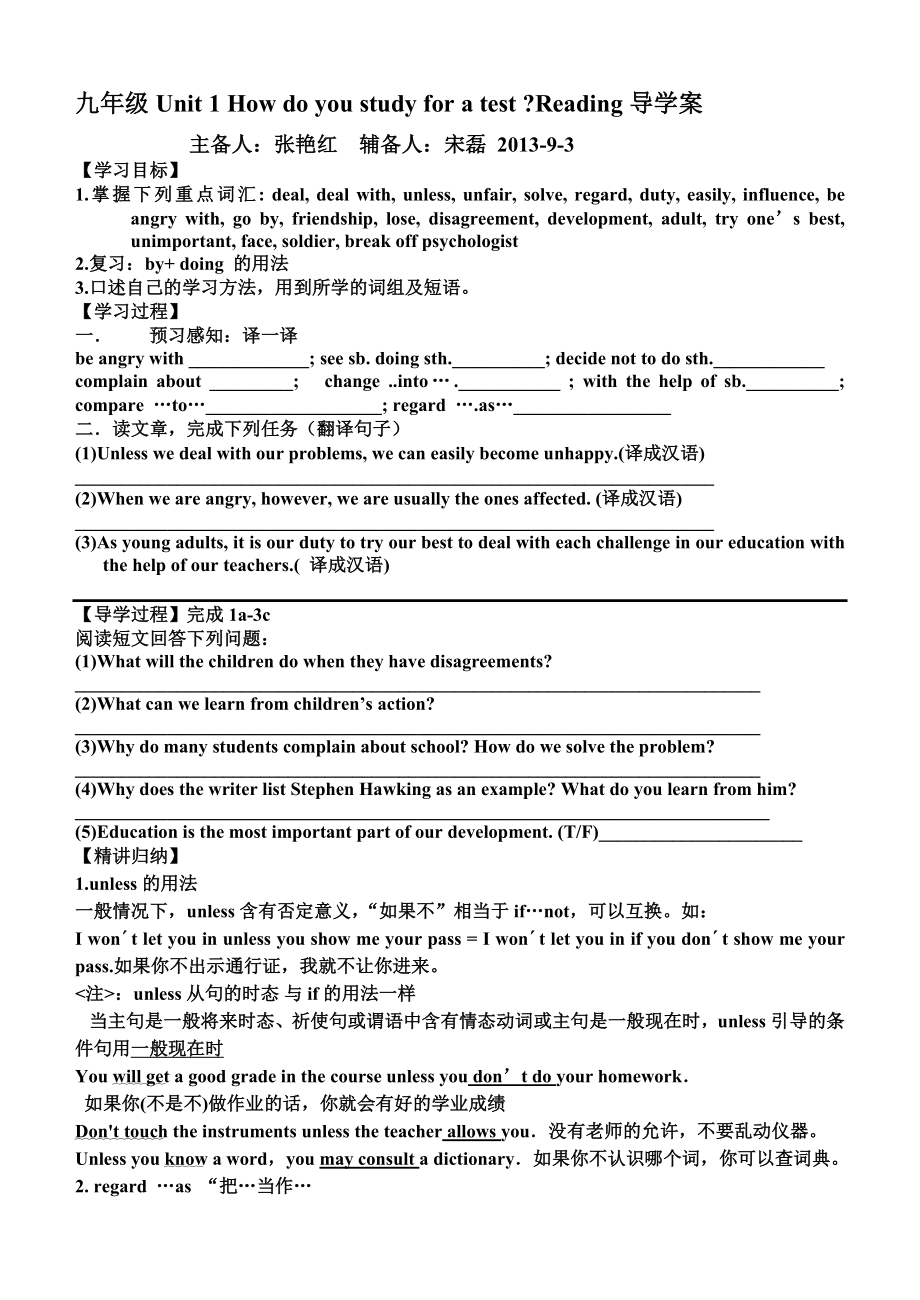《九年級(jí)Unit 1 How do you study for a test.Reading導(dǎo)學(xué)案doc》由會(huì)員分享��,可在線閱讀�����,更多相關(guān)《九年級(jí)Unit 1 How do you study for a test.Reading導(dǎo)學(xué)案doc(3頁珍藏版)》請(qǐng)?jiān)谘b配圖網(wǎng)上搜索���。
1�、九年級(jí)Unit 1 How do you study for a test ?Reading導(dǎo)學(xué)案
主備人:張艷紅 輔備人:宋磊 2013-9-3
【學(xué)習(xí)目標(biāo)】
1.掌握下列重點(diǎn)詞匯: deal, deal with, unless, unfair, solve, regard, duty, easily, influence, be angry with, go by, friendship, lose, disagreement, development, adult, try one’s best, unimportant, face, soldier, break off ps
2、ychologist
2.復(fù)習(xí):by+ doing 的用法
3.口述自己的學(xué)習(xí)方法��,用到所學(xué)的詞組及短語����。
【學(xué)習(xí)過程】
一. 預(yù)習(xí)感知:譯一譯
be angry with _____________; see sb. doing sth.__________; decide not to do sth.____________
complain about _________; change ..into….___________ ; with the help of sb.__________; compare …to…___________________; rega
3、rd ….as…_________________
二.讀文章���,完成下列任務(wù)(翻譯句子)
(1)Unless we deal with our problems, we can easily become unhappy.(譯成漢語)
_____________________________________________________________________
(2)When we are angry, however, we are usually the ones affected. (譯成漢語)
___________________________________
4�����、__________________________________
(3)As young adults, it is our duty to try our best to deal with each challenge in our education with the help of our teachers.( 譯成漢語)
【導(dǎo)學(xué)過程】完成1a-3c
閱讀短文回答下列問題:
(1)What will the children do when they have disag
5���、reements?
__________________________________________________________________________
(2)What can we learn from children’s action?
__________________________________________________________________________
(3)Why do many students complain about school? How do we solve the problem?
______________
6���、____________________________________________________________
(4)Why does the writer list Stephen Hawking as an example? What do you learn from him?
___________________________________________________________________________
(5)Education is the most important part of our development. (T/F)________
7�、______________
【精講歸納】
1.unless的用法
一般情況下�����,unless含有否定意義,“如果不”相當(dāng)于if…not����,可以互換。如:
I won′t let you in unless you show me your pass = I won′t let you in if you don′t show me your pass.如果你不出示通行證����,我就不讓你進(jìn)來。
<注>:unless從句的時(shí)態(tài)?與if的用法一樣
???當(dāng)主句是一般將來時(shí)態(tài)����、祈使句或謂語中含有情態(tài)動(dòng)詞或主句是一般現(xiàn)在時(shí),unless引導(dǎo)的條件句用一般現(xiàn)在時(shí)
You will get a
8�����、 good grade in the course unless you don’t do your homework.
如果你(不是不)做作業(yè)的話����,你就會(huì)有好的學(xué)業(yè)成績
Don't touch the instruments unless the teacher allows you.沒有老師的允許,不要亂動(dòng)儀器��。
Unless you know a word�,you may consult a dictionary.如果你不認(rèn)識(shí)哪個(gè)詞,你可以查詞典�����。
2. regard …as “把…當(dāng)作…
eg:By regarding problems as challenges通過將問題看
9、作挑戰(zhàn)
又eg:Think about Stephen Hawking, for example, a very clever scientist, who regards his many physical problems as unimportant想一想只蒂芬霍金�����,例如�,一位異常聰明的科學(xué)家,氫他的許多身體問題看得不重要�����。
eg:我們把老師當(dāng)作最好的朋友�����。We _________our teachers _______our best friends.”
3.deal with 其同義短語為do with. deal with與how 連用���,do
10�����、with與what 連用。
eg:How do we deal with our problems? (同義句轉(zhuǎn)換)
do we our problems?
4.Compare的用法:
1). 表示“把……與……比較”��,通常用compare…with…,
eg:If you compare his work with hers, you’ll find hers is much better.
要是把他倆的工作比較一下���,就會(huì)發(fā)現(xiàn)她的好得多��。
2. 表示“把……比作……”�,通常用compare…to…����,(一般不用compare…
11、with…)
eg:Shakespeare compared the world to a stage. 莎士比亞把世界比作舞臺(tái)�����。
<注>:但在現(xiàn)代英語中�,也可用compare… to…,或者用compare…and…����。
eg:By comparing yourself to(/with)other people, you will find your problems are not so terrible. 通過將你自己同別人比較,你會(huì)發(fā)現(xiàn)你的問題不是那么可怕�。
5. We must learn how to change these “problems” into “challe
12、nges”
我們必須學(xué)會(huì)怎樣變這些“問題”為“挑戰(zhàn)”��。
6. As young adults, it is our duty to try our best to deal with each challenge in our education with the help of our teachers. 在老師的幫助下盡力解決教育中的每一個(gè)挑戰(zhàn)是我們的責(zé)任��。
1)It+be+adj./n.+to do sth“做。�����。���。是�。����。?!保ㄆ渲衖t是形式主語,to do不定式才是真正的主語)
2)with the help of…“在�。。�����。的幫助下”(相當(dāng)于with sb’s/one’s
13�����、help)
eg:在老師的幫助下我通過了考試?。撸摺。撸摺���。撸摺�����。撸適y teacher , I passed the exam.
=__?��。撸摺。撸撸摺elp.
7.Let's not worry about our problems. Let’s face the challenges instead. (adv.)
不要擔(dān)心我們的問題�,讓我們迎接挑戰(zhàn)吧?���! 按妫喾础保ǔS谜Z句首或句中)
【達(dá)標(biāo)測評(píng)】
一�。根據(jù)漢意完成句子
1.時(shí)光飛逝,好的友誼可能會(huì)失去��。Time , and good may be .
2我
14��、們可以通過學(xué)習(xí)忘記來解決一個(gè)問題���。
We can a problem .
3. 作為年輕人���,在老師的幫助下盡全力去應(yīng)對(duì)學(xué)業(yè)中的每一次挑戰(zhàn)是我們的責(zé)任
young adults, it is our to our to deal with in our education the of
4. 我們絕大多數(shù)人也許都和師友���、父母發(fā)過生/生氣過。
of us have been
15���、 our friends, or teachers.
二.單項(xiàng)選擇:
( )1.___ you work harder, you will not pass the history exam.A .If B .Because C .Unless D .Until
( )2. -Let’s ____about future.A. not to worry B. not worry C. not worrying D .not to worrying
( )3.- “___is impolite to laugh at others.” -“I agree with you.”A. That B .This C .It D .There
【課堂賦分】The winner(s) is /are ________________ Congratulations (祝賀)����!
【課后作業(yè)】1.熟記本課時(shí)的單詞��、短語����、重點(diǎn)句及知識(shí)要點(diǎn)。
2.熟讀本課時(shí)課文(三遍)��,理解文章大意�����。
 九年級(jí)Unit 1 How do you study for a test.Reading導(dǎo)學(xué)案doc
九年級(jí)Unit 1 How do you study for a test.Reading導(dǎo)學(xué)案doc

